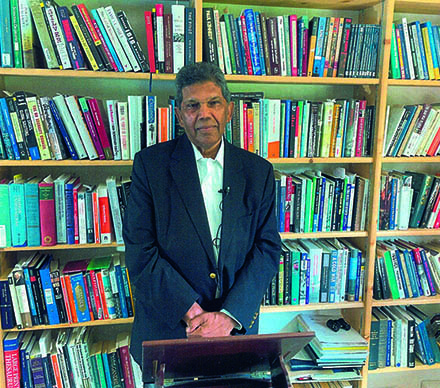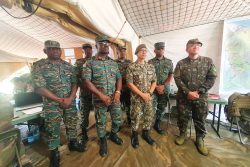By Dr Bertrand Ramcharan
Seventh Chancellor of the University of Guyana.
Formerly Director in the UN Department of Political Affairs; and formerly Special Envoy of the UN Secretary-General.
That there is a contemporary crisis of world order is beyond doubt. The question now is how to manage it, if possible. For this we need to look to the lessons of history and to insights from the fate of international law thus far.
In recent offerings we have discussed American, Chinese, and Russian conceptions of world order. We did so because these are the most powerful countries in the world, armed to the teeth with nuclear and other weapons of mass destruction, and having large armies. These are the powers whose actions can put the contemporary world order into crisis. And they have been doing so.
All three major powers have been acting in disregard of fundamental rules of international law. Russia invaded Ukraine in flagrant violation of the UN Charter. China refuses to be bound by an impartial decision of the Permanent Court of Arbitration holding its actions in the South China Sea to be unlawful, and it holds open the option of using its might to take over Taiwan by force. The Trump Administration in the USA is threatening to absorb Greenland, Canada, the Panama Canal, and Gaza, among other blatant violations of international law. Its message is clear: for the USA of President Trump, might is right.
How are we to manage this crisis of world order? In one of the classics of international history, Cambridge University historian, Fred Hinsley, wrote a magisterial book, Power and the Pursuit of Peace, in which he traced efforts over the centuries to pursue world peace by trying to manage the exercise of raw power. Three ideas stand out in Hinsley’s work: organizing international cooperation for peace through the establishment of international institutions; developing the rules of international law; and encouraging the peaceful settlement of disputes through negotiations, arbitration, and resort to judicial settlement. The Hague Peace Conferences of 1899 and 1907 were convened to pursue these ends.
Barely seven years after the second Hague Peace Conference of 1907, the world was plunged into the cataclysmic First World War, 1914-1918. Professor Lassa Oppenheim, then Professor of International law at Cambridge Univer-sity, and one of the most famous international lawyers in history, wrote a book in 1921 on the Future of International Law, in which he sought to peer into the future of international law. He could not see as realistic possibilities the establishment of a world state, or a world constitution. Nor did he see the possibility of the establishment of an international executive authority. He thought that one could build up international legislation through future international peace conferences such as those held in the Hague in 1899 and 1907. And he thought that one should appeal to the power of goodness in the world. Lassa Oppenheim’s book was published by the Carnegie Endowment for International Peace as part of an effort to strengthen international law.
As part of the same quest to build up the future of international law, Prof. Nicolas Politis of the University of Paris delivered a series of lectures at Columbia University in New York in 1925 on The New Aspects of International Law. His lectures were also published by the Carnegie Endowment for International Peace in 1925, exactly a hundred years ago. Politis saw opportunities for international law to reinforce the status of the individual in international law; to develop international penal law; to promote compulsory justice through institutions such as the Permanent Court of Inter-national Justice, the predecessor of today’s International Court of Justice, and to promote the codification and progressive development of international law.
The League of Nations, established as part of the Versailles peace settlement after the First World War, established a Committee for the progressive codification of international law that did good work in clarifying and codifying the content of international law. The Covenant of the League of Nations also provided for the establishment of the Permanent Court of International Justice, which rendered some landmark decisions clarifying the content of international law.
It is noteworthy that Prof. Politis hoped that the future international law would help reinforce the status of the individual in international law as well as the role of international courts and tribunals. Alas, international human rights law remains under siege in major parts of the world, and the Trump Administration has just brought in heavy sanctions against the International Criminal Court because of its decision to indict a serving Prime Minister and his then Minister of Defence for alleged war crimes and crimes against humanity.
Alas, following the betrayal of Ethiopia, invaded by Italy, the scheme of the League of Nations would crash after merely two decades, with the outbreak of the Second World War, which saw millions of deaths, widespread destruction, massive violations of human rights, including the Holocaust, and widespread displacement of people. The United Nations would begin anew, endeavouring to promote world peace through the peaceful settlement of disputes, equitable development for all, and respect for human rights and fundamental freedoms world-wide: Peace, Development, and Human Rights.
The United Nations Charter brought in an international legal regime that may be summarised thus: First, all States must fulfil in good faith the obligations they have freely undertaken in treaties. Second, all States must abide by what is known as customary international law, namely rules of international law that have attracted the widespread support of the great majority of nations over time. Third, States must abide by what are known as principles of international law shared by the principal legal systems of the world.
Fourth, there are some peremptory norms of international law that may never be breached in any circumstance. These include the principle of self-determination of peoples; the principle of non-aggression; and principles of international law for the protection of the integrity of the human being, such as the absolute prohibition of slavery, the prohibition of torture, and the prohibition of racial discrimination or apartheid.
It is a challenge for the international community to insist on the faithful compliance with these rules of international law by all States, large and small. When the major powers are in breach of these rules of international law, the world order is in crisis. As it is at the present time. And the United Nations is particularly in crisis.
Chapter VI, Article 33 of the UN Charter prescribes methods for the peaceful settlement of disputes such as negotiation, enquiry, mediation conciliation, arbitration, judicial settlement, or other peaceful means of their own choice. The UN Security Council, if it deems it necessary, may call upon the parties to settle their disputes by such means. Chapter VII of the UN Charter gives the Security Council stronger powers to act if it determines that there is a threat to peace, breach of the peace, or act of aggression.
Alas, the Security Council has been in deadlock for some time now. Five of the fifteen members of the Security Council have the power of veto, including the three leading global powers, America, China and Russia (ACR). (The other two veto powers are France and the UK). Russia uses the veto to protect itself from scrutiny in the Security Council following its invasion of Ukraine. The USA uses the veto to protect its ally, Israel, from scrutiny for its actions in Gaza. And China would not allow situations of international concern within its borders to be discussed in the Council.
Historically, the Security Council has occasionally acted for the protection of people at risk in places such as Francoist Spain, Southern Africa and Iraq. But the Security Council has not been willing to act on similar situations in our times, such as the situation in Gaza. We have just published a book on this subject: The Security Council and its Protective Function, which charts the protection practice of the Council, positive and negative.
In considering the gravity of the current crisis in world order, it needs to be recalled that the USA has just quit the World Health Organization (WHO), and is threatening to quit UNESCO. It is not to be ruled out that the USA could quit the United Nations itself, if, for example, it seeks to scrutinize events in Gaza and the West Bank, or if it is seen to be critical of the USA. President Trump’s nominee to be Ambassador to the UN has openly talked about the US quitting the UN.
How, then, are we to manage the contemporary crisis of world order. There are no easy answers and the situation is fraught with danger. We would venture three options for a start: First, Diplomacy. This is a time for cool heads and for careful diplomacy, especially on the part of the UN Secretary-General. This is not a time for hot-heads. Damage limitation, and buying time should be the driving motivations of diplomacy.
Second, there is an important role to be played by NGOs. During the Vietnam War, when there were widespread protests against illegal and inhumane American actions in Vietnam, the late Bertrand Russel, mathematician, philosopher and world statesman, joined with others in establishing the ‘Russel Tribunal’, which held hearings and pronounced on violations international humanitarian law and international human rights law then being committed by the USA. We have recently edited a volume on The Protection Roles of Human Rights NGOs, which contains an invaluable chapter by German Professor of International Law, Ekkehard Strauss, on how NGOs might establish a contemporary ‘Russel Tribunal’ to hold hearings and pronounce on the legality of the conduct of governments, including of all three major powers, America, China and Russia (ACR).
Third, urgent initiatives should be launched in the Legal Committee of the UN General Assembly (the Sixth Committee) and in the UN International Law Commission, on the future strengthening of international law. Small states, such as those of CARICOM, which need the protection of international law, could take the initiative in these fora.
And, finally, a word of caution: In a world of lawlessness by the major powers, and inaction by the Security Council, who will come to the protection of a small country in the event of aggression by a larger and more powerful neighbour?
Pray, Tell.










